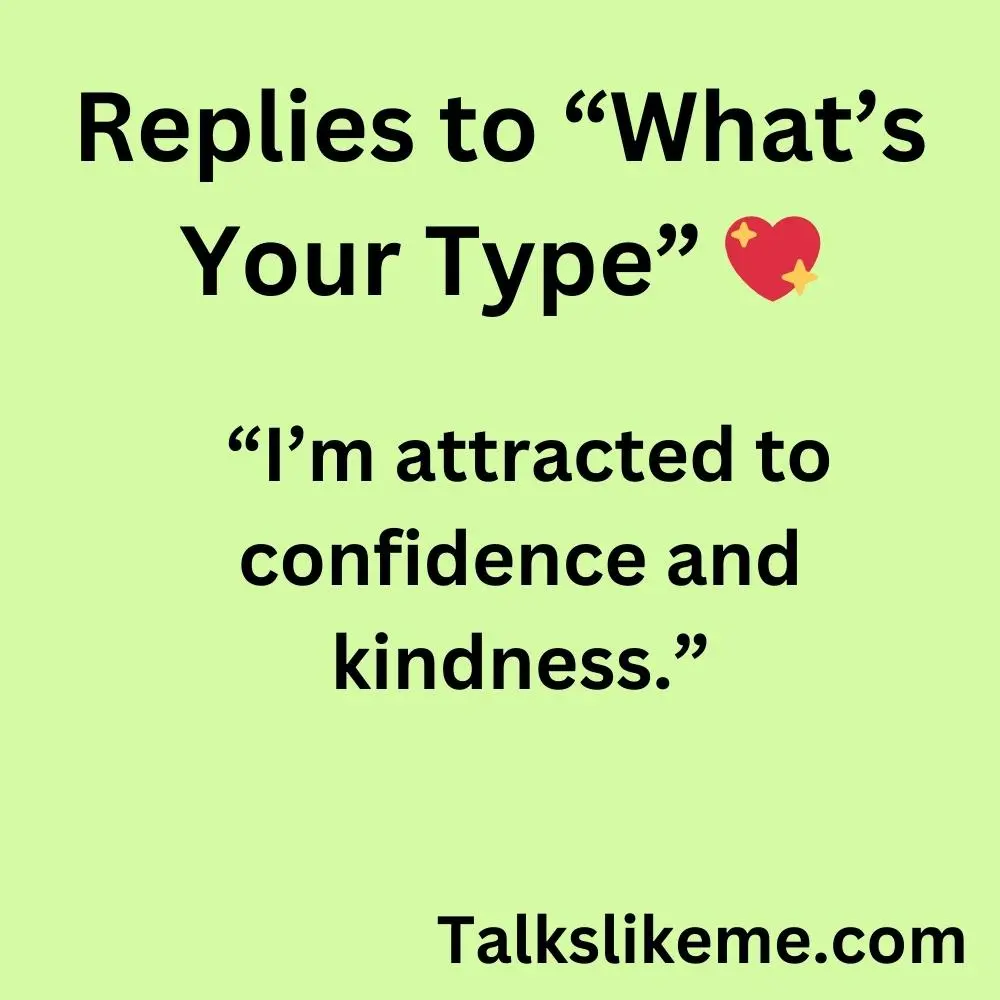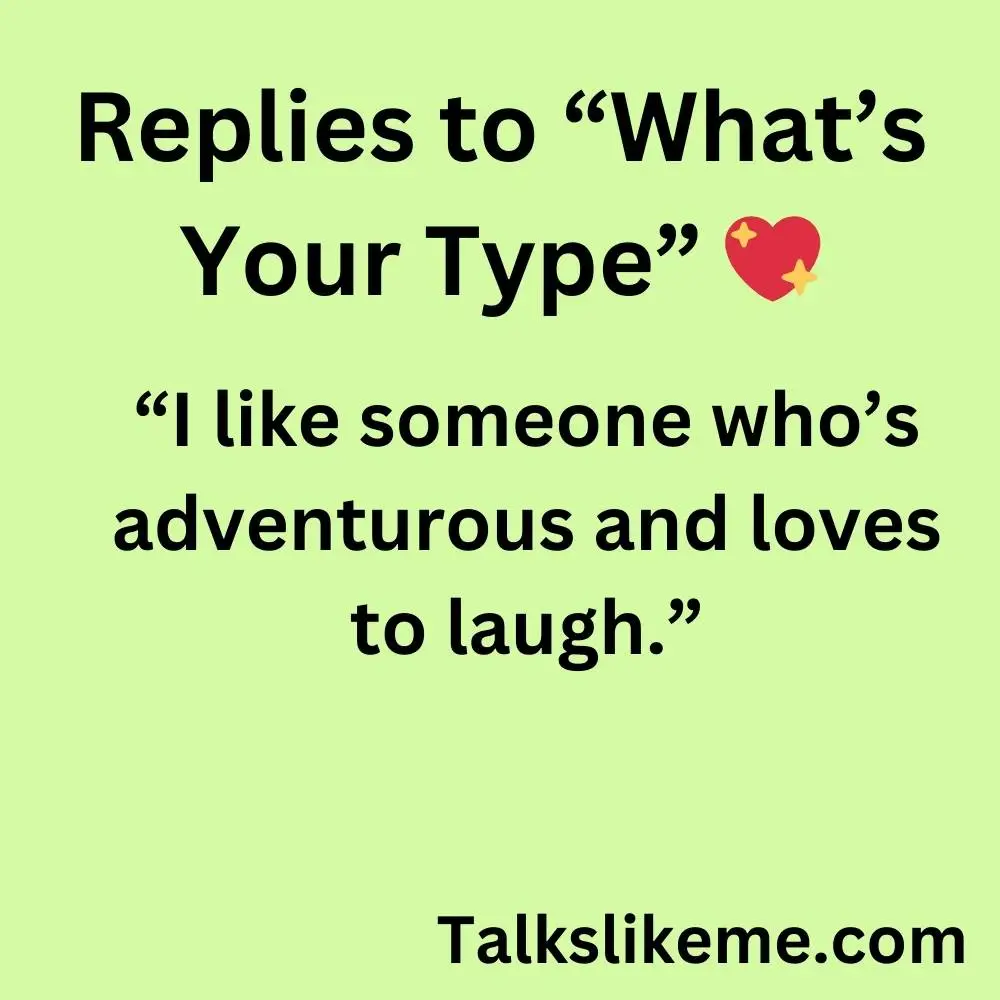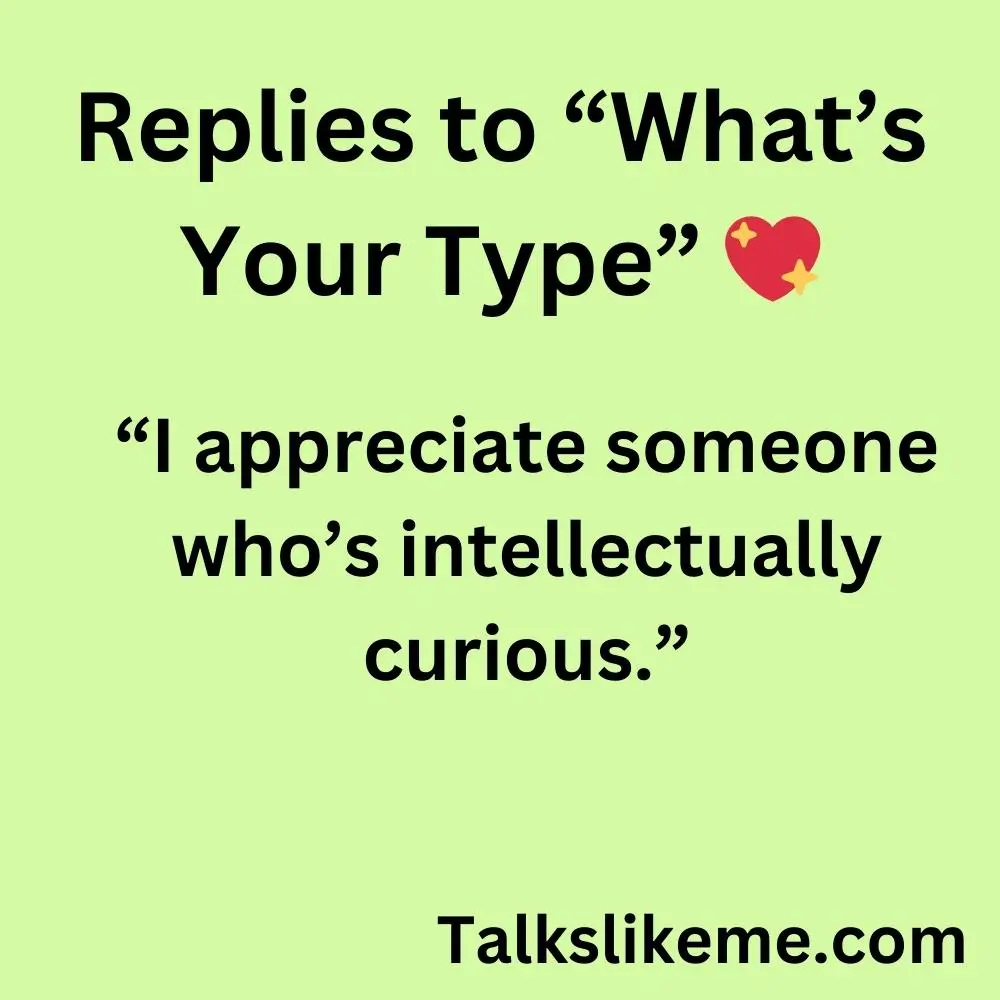Imagine you’re on a date, and your date suddenly asks, “What’s your type?” It’s a question that can be both intriguing and a little daunting. It’s not just about revealing your preferences but also about navigating the conversation smoothly.
Whether you’re interested in discussing your ideal partner or just want to steer the conversation in a different direction, how you respond can set the tone for the rest of your interaction.
Here are 30 creative and thoughtful ways to respond to “What is your type answer,” complete with tips on when to use each response.
Understanding the Question “What’s your type answer”
When someone asks, “What’s your type?” they’re usually trying to learn more about what you find attractive in a partner. Your response can reveal a lot about your personality and preferences. It’s a chance to share what you value in a relationship, or to steer the conversation in a direction you’re comfortable with.
1. “I’m attracted to confidence and kindness.”

Story: When asked about your type, saying, “I’m attracted to confidence and kindness,” highlights the qualities you value in a partner. It’s a way to express what matters most to you in relationships.
When to use: When you want to emphasize important personality traits.
When not to use: If you want to keep your preferences private.
Example: Date: “What’s your type?” You: “I’m attracted to confidence and kindness.”
2. “I like someone who’s adventurous and loves to laugh.”

Story: This response, “I like someone who’s adventurous and loves to laugh,” shares that you value a fun and spontaneous partner who enjoys life’s experiences.
When to use: When you want to highlight the importance of shared experiences and joy.
When not to use: If you prefer to keep your preferences more general.
Example: Date: “What’s your type?” You: “I like someone who’s adventurous and loves to laugh.”
3. “I appreciate someone who’s intellectually curious.”

Story: By saying, “I appreciate someone who’s intellectually curious,” you convey that you value deep conversations and a desire for learning in a partner.
When to use: When you want to emphasize the importance of intellectual connection.
When not to use: If you want to avoid discussing specific traits.
Example: Date: “What’s your type?” You: “I appreciate someone who’s intellectually curious.”
Check Out: Best Replies to “How Art Thou?”
4. “I’m drawn to creativity and passion.”
Story: If you respond with, “I’m drawn to creativity and passion,” it shows that you value someone who has a vibrant and expressive personality.
When to use: When you want to emphasize the importance of creativity and enthusiasm.
When not to use: If you want to give a more traditional answer.
Example: Date: “What’s your type?” You: “I’m drawn to creativity and passion.”
5. “I like someone who’s supportive and understanding.”
Story: When you say, “I like someone who’s supportive and understanding,” you highlight the importance of emotional support and empathy in a relationship.
When to use: When you want to discuss the value of emotional connection.
When not to use: If you want to keep the conversation light.
Example: Date: “What’s your type?” You: “I like someone who’s supportive and understanding.”
6. “I appreciate someone who’s ambitious and driven.”
Story: Responding with, “I appreciate someone who’s ambitious and driven,” shows that you value motivation and goal-oriented individuals.
When to use: When you want to emphasize career and personal growth.
When not to use: If you prefer to focus on personal traits rather than ambitions.
Example: Date: “What’s your type?” You: “I appreciate someone who’s ambitious and driven.”
7. “I’m attracted to someone who has a great sense of humor.”
Story: By saying, “I’m attracted to someone who has a great sense of humor,” you convey that you value someone who can make you laugh and enjoys fun moments.
When to use: When humor is important in your relationships.
When not to use: If you want to discuss other traits.
Example: Date: “What’s your type?” You: “I’m attracted to someone who has a great sense of humor.”
8. “I like someone who’s genuine and authentic.”
Story: When asked about your type, you might say, “I like someone who’s genuine and authentic,” to show that honesty and being real are important to you.
When to use: When you value authenticity in a relationship.
When not to use: If you want to keep your answer less specific.
Example: Date: “What’s your type?” You: “I like someone who’s genuine and authentic.”
Whether you’re a professional photographer or just love taking pictures, Photosfile offers a seamless solution. From advanced search features to secure storage, it covers all your needs. Imagine never losing track of a special moment again. Photosfile ensures your memories are always safe and accessible. Ready to learn more about how Photosfile can help you? Keep reading to discover its amazing benefits.
9. “I’m drawn to someone who’s emotionally mature.”
Story: If you respond with, “I’m drawn to someone who’s emotionally mature,” it reflects that you value emotional stability and depth in a partner.
When to use: When emotional maturity is important to you.
When not to use: If you want to keep your preferences more casual.
Example: Date: “What’s your type?” You: “I’m drawn to someone who’s emotionally mature.”
10. “I appreciate someone who’s passionate about their hobbies.”
Story: By saying, “I appreciate someone who’s passionate about their hobbies,” you highlight the importance of having interests and hobbies in a partner’s life.
When to use: When you value personal interests and enthusiasm.
When not to use: If you prefer to discuss general traits.
Example: Date: “What’s your type?” You: “I appreciate someone who’s passionate about their hobbies.”
11. “I’m attracted to someone who’s caring and compassionate.”
Story: When you answer with, “I’m attracted to someone who’s caring and compassionate,” it shows that kindness and empathy are key qualities you seek.
When to use: When emotional warmth is important to you.
When not to use: If you want to discuss other traits.
Example: Date: “What’s your type?” You: “I’m attracted to someone who’s caring and compassionate.”
12. “I like someone who’s independent and self-sufficient.”
Story: If you respond with, “I like someone who’s independent and self-sufficient,” it indicates that you value a partner who can take care of themselves.
When to use: When you appreciate self-reliance in a partner.
When not to use: If you prefer to focus on interpersonal traits.
Example: Date: “What’s your type?” You: “I like someone who’s independent and self-sufficient.”
13. “I’m drawn to someone who’s open-minded and accepting.”
Story: By saying, “I’m drawn to someone who’s open-minded and accepting,” you highlight the importance of tolerance and open-mindedness in a relationship.
When to use: When you value inclusivity and acceptance.
When not to use: If you want to discuss other personal qualities.
Example: Date: “What’s your type?” You: “I’m drawn to someone who’s open-minded and accepting.”
14. “I appreciate someone who’s loyal and dependable.”
Story: When you say, “I appreciate someone who’s loyal and dependable,” it shows that trust and reliability are crucial to you in a partner.
When to use: When you value trustworthiness and dependability.
When not to use: If you want to discuss other traits.
Example: Date: “What’s your type?” You: “I appreciate someone who’s loyal and dependable.”
15. “I like someone who’s adventurous and enjoys trying new things.”
Story: Responding with, “I like someone who’s adventurous and enjoys trying new things,” indicates that you value a sense of adventure and novelty.
When to use: When you enjoy exploring new experiences with a partner.
When not to use: If you want to focus on other qualities.
Example: Date: “What’s your type?” You: “I like someone who’s adventurous and enjoys trying new things.”
16. “I’m attracted to someone who’s optimistic and positive.”
Story: If you answer with, “I’m attracted to someone who’s optimistic and positive,” it shows that you value a positive outlook on life in a partner.
When to use: When you appreciate an upbeat attitude.
When not to use: If you want to focus on other traits.
Example: Date: “What’s your type?” You: “I’m attracted to someone who’s optimistic and positive.”
17. “I appreciate someone who’s respectful and thoughtful.”
Story: By saying, “I appreciate someone who’s respectful and thoughtful,” you highlight the importance of consideration and respect in a relationship.
When to use: When you value respect and thoughtfulness.
When not to use: If you want to discuss other qualities.
Example: Date: “What’s your type?” You: “I appreciate someone who’s respectful and thoughtful.”
18. “I like someone who’s spontaneous and fun-loving.”
Story: When you respond with, “I like someone who’s spontaneous and fun-loving,” it shows that you value excitement and spontaneity in a partner.
When to use: When you enjoy a partner who adds excitement to life.
When not to use: If you prefer a more stable answer.
Example: Date: “What’s your type?” You: “I like someone who’s spontaneous and fun-loving.”
19. “I’m drawn to someone who’s ambitious and career-focused.”
Story: By saying, “I’m drawn to someone who’s ambitious and career-focused,” you convey that you value professional drive and ambition.
When to use: When career goals are important to you in a partner.
When not to use: If you want to discuss other personal traits.
Example: Date: “What’s your type?” You: “I’m drawn to someone who’s ambitious and career-focused.”
20. “I appreciate someone who’s patient and understanding.”
Story: If you respond with, “I appreciate someone who’s patient and understanding,” it shows that you value calmness and empathy in a partner.
When to use: When you value patience and understanding.
When not to use: If you want to focus on other qualities.
Example: Date: “What’s your type?” You: “I appreciate someone who’s patient and understanding.”
Make every little moment special—visit our Best Reply site now at talkslikeme for more articles and the best responses
21. “I like someone who’s creative and loves art.”
Story: By saying, “I like someone who’s creative and loves art,” you convey that you value artistic interests and creativity.
When to use: When creativity and art are important to you.
When not to use: If you want to discuss other traits.
Example: Date: “What’s your type?” You: “I like someone who’s creative and loves art.”
22. “I’m attracted to someone who’s disciplined and goal-oriented.”
Story: When you respond with, “I’m attracted to someone who’s disciplined and goal-oriented,” it highlights that you value structure and focus.
When to use: When you appreciate discipline and ambition.
When not to use: If you want to discuss more personal traits.
Example: Date: “What’s your type?” You: “I’m attracted to someone who’s disciplined and goal-oriented.”
23. “I appreciate someone who’s kind and empathetic.”
Story: If you say, “I appreciate someone who’s kind and empathetic,” it shows that compassion and kindness are important to you.
When to use: When you value kindness and empathy.
When not to use: If you want to discuss other aspects of your type.
Example: Date: “What’s your type?” You: “I appreciate someone who’s kind and empathetic.”
24. “I like someone who’s self-assured and grounded.”
Story: By saying, “I like someone who’s self-assured and grounded,” you indicate that you value confidence and stability.
When to use: When confidence and stability are important to you.
When not to use: If you want to discuss other traits.
Example: Date: “What’s your type?” You: “I like someone who’s self-assured and grounded.”
25. “I’m attracted to someone who’s generous and giving.”
Story: If you respond with, “I’m attracted to someone who’s generous and giving,” it shows that you value generosity and a giving nature.
When to use: When you value a giving and generous personality.
When not to use: If you want to discuss other qualities.
Example: Date: “What’s your type?” You: “I’m attracted to someone who’s generous and giving.”
26. “I appreciate someone who’s witty and clever.”
Story: By saying, “I appreciate someone who’s witty and clever,” you convey that you value intelligence and humor.
When to use: When you enjoy a sharp and humorous partner.
When not to use: If you want to discuss other traits.
Example: Date: “What’s your type?” You: “I appreciate someone who’s witty and clever.”
27. “I like someone who’s grounded and realistic.”
Story: If you answer with, “I like someone who’s grounded and realistic,” it shows that you value practicality and a down-to-earth attitude.
When to use: When you appreciate a realistic approach.
When not to use: If you want to discuss more imaginative traits.
Example: Date: “What’s your type?” You: “I like someone who’s grounded and realistic.”
28. “I’m drawn to someone who’s nurturing and supportive.”
Story: By saying, “I’m drawn to someone who’s nurturing and supportive,” you highlight the importance of care and support in a relationship.
When to use: When you value nurturing and supportive qualities.
When not to use: If you want to discuss other traits.
Example: Date: “What’s your type?” You: “I’m drawn to someone who’s nurturing and supportive.”
29. “I appreciate someone who’s open and honest.”
Story: If you respond with, “I appreciate someone who’s open and honest,” it shows that transparency and truthfulness are important to you.
When to use: When honesty and openness are key to you.
When not to use: If you want to focus on other traits.
Example: Date: “What’s your type?” You: “I appreciate someone who’s open and honest.”
30. “I like someone who’s family-oriented and caring.”
Story: By saying, “I like someone who’s family-oriented and caring,” you convey that you value family values and care in a partner.
When to use: When family values and caring nature are important to you.
When not to use: If you want to discuss other aspects.
Example: Date: “What’s your type?” You: “I like someone who’s family-oriented and caring.”
31.“Someone who can make me laugh and think at the same time.”
Story: During a fun conversation with friends, someone asked me, “What’s your type?” I replied, “Someone who can make me laugh and think at the same time.” It felt genuine and showed I appreciate both humor and intelligence.
When to use: In relaxed, flirty, or friendly conversations where you want to share your preferences without being too serious.
When not to use: In formal or professional environments, or if the conversation feels too personal for the setting.
Example:
Person: “What’s your type?”
You: “Someone who can make me laugh and think at the same time.”
Top Editor’s Choice Responses
- “I’m attracted to confidence and kindness.”
Situation: When you want to highlight key personality traits. - “I like someone who’s adventurous and loves to laugh.”
Situation: When you value fun and spontaneity. - “I appreciate someone who’s intellectually curious.”
Situation: When you value intellectual conversations. - “I’m drawn to creativity and passion.”
Situation: When you value artistic expression. - “I like someone who’s supportive and understanding.”
Situation: When emotional support is crucial. - “I appreciate someone who’s ambitious and driven.”
Situation: When professional goals are important. - “I’m attracted to someone who has a great sense of humor.”
Situation: When humor is essential. - “I like someone who’s genuine and authentic.”
Situation: When authenticity is important. - “I’m drawn to someone who’s emotionally mature.”
Situation: When emotional stability is valued. - “I appreciate someone who’s loyal and dependable.”
Situation: When trustworthiness is key.



